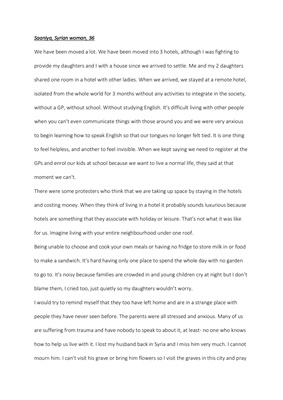
Saaniya, Syrian woman, 36
We have been moved a lot. We have been moved into 3 hotels, although I was fighting to
provide my daughters and I with a house since we arrived to settle. Me and my 2 daughters
shared one room in a hotel with other ladies. When we arrived, we stayed at a remote hotel,
isolated from the whole world for 3 months without any activities to integrate in the society,
without a GP, without school. Without studying English. It's difficult living with other people
when you can't even communicate things with those around you and we were very anxious
to begin learning how to speak English so that our tongues no longer felt tied. It is one thing
to feel helpless, and another to feel invisible. When we kept saying we need to register at the
GPs and enrol our kids at school because we want to live a normal life, they said at that
moment we can't.
There were some protesters who think that we are taking up space by staying in the hotels
and costing money. When they think of living in a hotel it probably sounds luxurious because
hotels are something that they associate with holiday or leisure. That's not what it was like
for us. Imagine living with your entire neighbourhood under one roof.
Being unable to choose and cook your own meals or having no fridge to store milk in or food
to make a sandwich. It's hard having only one place to spend the whole day with no garden
to go to. It's noisy because families are crowded in and young children cry at night but I don't
blame them, I cried too, just quietly so my daughters wouldn't worry.
I would try to remind myself that they too have left home and are in a strange place with
people they have never seen before. The parents were all stressed and anxious. Many of us
are suffering from trauma and have nobody to speak to about it, at least- no one who knows
how to help us live with it. I lost my husband back in Syria and I miss him very much. I cannot
mourn him. I can't visit his grave or bring him flowers so I visit the graves in this city and pray